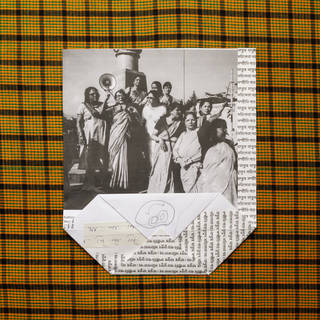The finalists’ diverse practices span graphic design and fashion, typography and textiles, installation and activism. Their work addresses the personal and the political, interpreting the past in creative and critical ways. Jameel Prize: Poetry to Politics reflects the ways in which Islamic art and culture remain rich sources of inspiration for contemporary design.
For this edition, applications to the Jameel Prize were accepted via open call and nomination. Over 400 entries were received from designers all over the world. An international jury selected eight finalists for the exhibition at the V&A, and the winner, who receives £25,000. Ajlan Gharem was announced as the winner of the sixth Jameel Prize in an online ceremony on 15 September 2021.
Jameel Prize: Poetry to Politics was open at the V&A from 18 September – 28 November 2021. The exhibition will tour to two international venues after the V&A.
The jury
Dr Tristram Hunt, Director of the V&A (Chair)
Alice Rawsthorn, design critic and author
Sultan Sooud Al-Qassemi, writer, researcher and founder of Barjeel Art Foundation
Mehdi Moutashar, artist and joint winner of Jameel Prize 5
Marina Tabassum, architect and joint winner of Jameel Prize 5
The winner

Ajlan Gharem
Ajlan Gharem (b. 1985, Saudi Arabia) is an artist and mathematics teacher. His work explores the changing nature of society in Saudi Arabia. Gharem’s architectural installation Paradise Has Many Gates is true to the form and design of a traditional mosque, but is made of the cage-like chicken wire used for border walls and prison fences. Although the wire feels uninviting, even frightening, it also renders the mosque transparent and open – even welcoming.
The finalists

Golnar Adili
Golnar Adili (b. 1976, USA) is an artist and designer based in New York. Growing up in Tehran after the 1979 Revolution, Adili’s early life was characterised by separation and uprootedness. Her practice explores aspects of her identity through Persian language and poetry. Her work on display in the Jameel Prize pays homage to her father, transforming one of his letters into an installation both monumental and delicate.


Hadeyeh Badri
For Hadeyeh Badri (b. 1988, UAE), textiles offer a rich creative language. Her weavings incorporate Arabic writing into the dense and delicate fabric. The text is personal, taken from the diary of Badri’s beloved late aunt, and Badri uses weaving as a way of reconnecting with her. Calling upon poetic tropes and their connection to memory, Badri considers her textiles intimate, imperfect monuments to loved ones.


Kallol Datta
Kallol Datta (b. 1982, India) is a clothing designer from Kolkata. Datta is interested in clothing practices from North Africa, West Asia, the Indian subcontinent and the Korean peninsula. His design process involves rigorous creative research and experimental pattern-cutting. In his bold contemporary clothing, Datta mines and combines the shapes of the abaya, manteau, hanbok, hijab and caftan, with gestures of enveloping, layering and veiling.


Farah Fayyad
Farah Fayyad (b. 1990, Lebanon) is a graphic designer and printmaker. During popular uprisings in Lebanon in 2019, Fayyad and a group of friends installed a manual screen-printing press at the heart of the Beirut protests. They printed artworks and slogans by local designers onto the clothing of protestors, bringing Arabic typography into the public and political sphere. Equally passionate about Arabic typography, her contemporary typeface, Kufur, is based on historic Kufic calligraphy.


Sofia Karim
Sofia Karim (b. 1976, UK) is an architect, artist and activist. Her Turbine Bagh project was inspired by the 2019 protests in Shaheen Bagh, a neighbourhood in Delhi, against the Indian government’s Citizenship Amendment Act. The Act is part of an alarming rise in Islamophobic attitudes and legislation in India. As the protests have grown into an historic civil rights movement, Karim invites artists, writers and thinkers to design samosa packets for Shaheen Bagh.


Jana Traboulsi
Jana Traboulsi (b. 1979, Lebanon) is an artist and graphic designer. Stemming from research into Middle Eastern book-making traditions, Traboulsi's Kitab al-Hawamish (Book of Margins), 2017, explores margins and marginalia in Arabic manuscript production. Kitab al-Hawamish celebrates subtle elements of book design: from letter shapes to phonetics and footnotes, the materiality of parchment and the role of recitation, the function of catchwords, and the origins of paper formats.


Bushra Waqas Khan
Bushra Waqas Khan (b. 1986, Pakistan) was originally trained as a printmaker, but today designs and constructs intricate dresses at miniature scale. Her inspiration and source material is affidavit paper, which is decorated with national emblems and Islamic patterns, and used for all official documents in Pakistan. Khan transfers the paper’s patterns onto fabric, which she cuts and embroiders into elaborate garments.


